#HT tech
Explore tagged Tumblr posts
Text
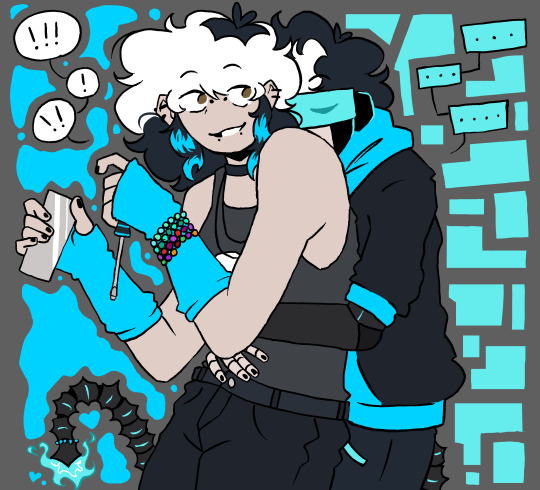
the silliest guys in the world <3
#just roll with it#au shennanigans#art shennanigans#do ht have a tag on my blog ? i do not beleive so#haunted tech#they do now
23 notes
·
View notes
Note
new casey podcast have you seen it
https://m.youtube.com/watch?si=ye8wNfrvaPDjtpDV&v=IuwZN6aP8sg&feature=youtu.be
(link to the podcast) yeah I did, cheers!
there's not that much 'new information' per se within this podcast, though there's a bunch of nice tidbits about teenage casey. what stood out to me is how the framing of his journey to becoming a racer is... well, it's kinda new? it's not exactly surprising, because you could get a lot of this stuff from reading between the lines in his autobiography. the question of 'is this your dream or your parents' dream' is a very common one with athletes, and it's often a thin line... but, y'know, this podcast interview in particular is quite a noticeable shift in how casey himself talks about this issue. it's a shift in how he portrays his 'dream' of becoming a professional rider back when he was formulating his autobiography, versus how he's answering questions in this episode. his autobiography isn't free from criticism of his parents - but casey is always stressing his own desire to race. so you do get stuff like this (from the autobiography):
At this point things were getting serious. Dad used to say, 'If you want to become World Champion you can't be that much better than local competition,' holding his finger and thumb an inch apart. 'You have to be this much better,' he'd say, holding his arms wide open. Dad confirms this feeling still today: 'I know it's a harsh way to look at things but that's the difference between a champion and the rest. Just look at the careers of Dani Pedrosa and Jorge Lorenzo. Dani had Alberto Puig and Jorge had his old man, both of them hard as nails. If you want to make it to the top I think it takes somebody with an unforgiving view on life to help get you there. So I said those things to Casey, particularly when we went to the UK, because to keep moving up a level he couldn't just be happy with winning a race. If he wasn't winning by a margin that represented his maximum performance then he wasn't showing people how much better he was than the rest.' There's no denying that Dani, Jorge and I became successful with that kind of upbringing and sometimes you probably do need it. As far as I'm concerned Alberto was nowhere near as tough on Dani as my dad was on me or Jorge's dad was on him. That kind of intensity and expectation puts a lot of extra pressure on a father-son relationship that isn't always healthy. We definitely had our moments and there were a few major blow-ups to come. But at the time, rightly or wrongly, it was proving to be a good system for us and I was eager to continue impressing my dad and others with my performances on the track.
(quick reminder, jorge's review of his father's style of parenting was describing him as "a kind of hitler")
but in general the emphasis is very much on how much casey enjoyed racing, on how single-minded casey was when it came to racing. he might have been isolated by his racing (again this is from the autobiography, in the context of discussing being bullied by kids in school until he got 'protection' from his dirt track friends):
School life was a whole lot better after that but I still hated it. All my real friends were from dirt-track; they were the only people I had anything in common with.
and he's talked about how other parents misinterpreted his shyness as him not actually wanting to race, which meant they were judging casey's parents as a result (autobiography):
Mum tells me that the other parents thought she and Dad were awful because I cried as I lined up on the start line. She remembers: 'I was putting his gloves on his hands and pushing his helmet over his head. The thing was, I knew Casey wasn't crying because he didn't want to ride or because he was scared. He just didn't like the attention of being stared at by all these people!'
but like. overall racing for him was still something he portrayed as a very positive aspect of his childhood. something he always clung onto, something that was his choice to pursue
so... let's play compare and contrast with some specific passages of the autobiography and this podcast, you decide for yourself. take this from his autobiography:
After I started winning more times than not, and it was obvious my passion for bikes wasn't wavering, Mum and Dad decided that seeking out sponsors could be a great idea to help offset some of the costs of travelling to meets and keeping the bikes in good order.
and here, in a longer excerpt about what a sickly child casey was, what his mother said (autobiography):
'They tested him for cystic fibrosis and he was on all kinds of medication; you name it, he was on it. But Casey still raced, we couldn't stop him.' I know I was sick but Mum was right, I wasn't going to let that stop me.
versus this from the podcast, when he's responding to a completely open question about how he got into riding:
To be honest, I don't know if I was allowed to have any other attraction to be honest. I think it was, you know, you're going to be a bike rider from when I was a very very young age - and I'm not the only one to think that. I think my parents have stated that enough times to certain people and you know I was sort of pushed in that direction. My elder sister who's six and a half years older than me, she actually raced a little bit of dirt bikes and dirt track before I was born and when I was very young, so it was sort of a natural progression to go and do a little bit more of that and I think because at the time road racing was a lot more similar to dirt track. That was our sort of way in.
this was one of the very first questions in the interview, it basically just consisted of asking casey how he got into biking in the first place - whether it had come through his family or whatever. casey chose to take the response in that direction... it's not an answer that is just about his own internal passion, how he loved riding the second he touched a bike, how he loved it throughout his childhood etc etc (which is how it's framed in the autobiography) - but instead he says he wasn't allowed to do anything else. he says that he was pushed in that direction, that his parents have openly said as much to others. that he feels vindicated in the belief he was never given another choice
let's play another round. here from the autobiography:
Mum and Dad used to stand at the side for hours on end watching me practise at different tracks. They'd sometimes clock laps with a stopwatch as I went round and round. Other parents couldn't see the point in taking it so seriously but they didn't realise it was what I wanted. I was having fun. Working out how to go faster was how I got my kicks and I couldn't stop until I had taken a tenth or two of a second off my best time on any day. If another kid came out onto the track with me I would be all over them, practising passing them in different ways and in different corners, but most of the time they avoided riding with me and I would be out there on my own, racing the clock.
and this (autobiography):
I enjoyed racing so much that even when I was at home riding on my own I would set up different track configurations to challenge myself. I'd find myself a rock here, a tree there, a gatepost over there and maybe move a branch and that would be my track.
versus here, in the podcast:
Q: And did you realise at the time that you were - not groomed, is not the word but well you were being groomed to be a professional motorcycle racer, or obviously that was your only one reference point, that was the norm. Did that just feel the norm or did you think actually this feels a bit intense or how did you feel about it? A: I think it's hard, it's not until I sort of reached my mid teens where I started to have a bit of a reality check on what I was actually doing. Before then, you know I was competitive. I'm not as competitive as people think, I'm a lot more competitive internally rather than externally versus other people. I always challenge myself to things, so all those younger years was just getting the job done that I was expected to do. I enjoyed winning, I loved it, but you know I enjoyed perfect laps, perfect races, as close as I could get to that and you know from a young age I always sort of challenged myself constantly to be better. So I didn't just win races, I tried to win them - you know, if I won races by five seconds in a [...] race I'd try and win, you know I'd try and get to double that by the end of the day if I could. So you know that always kept me sharp and it stopped me from being sort of, you know, complacent in the position I was at. And it wasn't until sort of you know 16, 17, 18 that reality kicked in. I'd had a couple years road racing in the UK and Spain, been rather successful and then you get to world championships and you know maybe an engineer that was sort of - didn't have your best interests at hear. And, you know, I nearly finished my career right there after my first year of world championships just because of the reality of how hard it was in comparison to everything else I'd experienced up to that point. And, you know, it was a real reality check for me and I think it was then that I started to - you know consider everything around me and consider how and why I got to the position that I was in and that's when the mind started to change a little bit and realise that you know I really was being groomed my whole life just to sort of be here and be put on a track and try and win. And, you know, that was my seemingly most of my existence.
in all the excerpts, he stresses how much he enjoys his perfect laps, how much he enjoys riding, how there is genuine passion there, how dedicated he is to this pursuit... but then in the podcast, he's adding something else - how he'd been groomed his whole life into that role of 'professional bike racer'. that it was only in his late teens (when he was in 125cc/250cc) where he had this moment of 'man I never really had a choice in all this'
and another round. here's him talking in the autobiography about how all the money he got through racing went back into racing - but it was fine because it was the only thing he cared about anyway:
I don't remember seeing any of the money I earned because it all went back into my racing, although I guess at the time that's all I really cared about anyway. I didn't know anything else. Mum and Dad always said to me: 'If you put in the effort, we'll put in the effort.'
and here in the autobiography on how he just wanted to ride all day:
I couldn't ride my bike all day, though, as much as I would have liked to.
and him talking in the autobiography about his parents encouraging him and his sister to 'chase their dreams':
Mum and Dad encouraged both Kelly and me to follow our passions and work hard to chase our dreams. That might sound strange when you are talking about a seven-year-old but I don't think you are never too young to know that if you want something you have to earn it.
versus this in the podcast:
Q: And I've never asked you this before, but did you want to? A: Um... I think I'd been convinced of a dream I suppose. You know, yes I loved riding bikes and you know I really did enjoy racing... but there was lots of other things that I - I really enjoyed as well but just never had the opportunity or never was allowed to do anything else, so... You know, motorbikes for our budget everything fortunately dirt track was probably the cheapest way that you could go motorbike racing. You could survive on very very little in dirt track and show your potential in other ways. You know, yes, having good bikes and good tyres and all that sort of thing made a difference but it wasn't the be all end all, you could always make a difference in other ways, so... I think it was, you know - the best thing we could have done, racing through that. Like I said I enjoyed it, it wasn't until late teens, early 20s where I sort of was like, I don't know if I would have been a bike racer had I actually had a choice.
was riding really all he cared about? or were there other things he was interested in, things he just never had the opportunity to pursue? things he wasn't allowed to pursue? from the autobiography, you get the sense that his parents always deliberately portrayed it as casey's dream, something he was expected to work hard for in order to be allowed to fulfil. in the podcast, casey says it was a dream he was 'convinced' of. without wanting to speak too much on the specifics of this parenting relationship we only have limited knowledge of, this kinda does all sound like athlete parent 101: getting it into their kids' heads that this is the dream of the child, not the parent, before holding it over them when they fail to perform when their parents have invested so so much in their child's success. casey's family was financially completely dependent on his racing results when they moved to the uk - he was fourteen at the time. he was painfully conscious of his parents' 'sacrifice' to make 'his dream' possible. can you imagine what kind of pressure that must be for a teenager?
to be clear, this isn't supposed to be a gotcha, I'm not trying to uncover contradictions between what casey said back then and what he's saying now. obviously, this is all very... thorny, complicated stuff, and casey has had to figure out for himself how he feels about it, how he feels about how his parents approached his upbringing. but it is worth pointing out that this isn't necessarily just a question of his feelings changing over time - if the internal timeline he provides in the podcast is correct, he was really having that realisation in his late teens, early 20s, so on the verge of joining the premier class. that is when he says he had the thought "I don't know if I would have been a bike racer had I actually had a choice"... which is a pretty major admission, you have to say, especially given how rough those premier class years often ended up being on him. but then that realisation would have already come years and years before he wrote his autobiography, it would've been something he carried with him for most of his career. given that, you do look at his autobiography and think that he did make the decision to frame things pretty differently back then, that he decided to exclude certain things from his narrative. if this really is already something that's been festering within him for years, if he does feel like he wants to be a bit more open about all of that now than back then... well, hopefully it shows he's been able to work through all of it a bit more in the intervening years
(this is somehow an even thornier topic than his relationship with parents, but relatedly there is a bit of a discrepancy between how bullish he is in his autobiography about how mentally unaffected he was by his results, versus how he's since opened up since then about his anxiety. again, I want to stress, this is not a gotcha, he's under no obligation to share this stuff with the world - especially given the amount of discourse during his career about his supposed 'mental weakness'. it is still important in understanding him, though, how he consciously decided to tell his own story in the autobiography and how he's somewhat changed his approach in the subsequent years)
this is the rest of his answer to that podcast question I relayed above:
But at the same time you know I felt that no matter what I would have done, I sort of have a - my mentality of self-punishment, you know, of never being good enough that always drove me to try and be better and any single thing that I did, I didn't like it when I wasn't not perfect. I don't believe in the word perfect but I really didn't enjoy when I wasn't, you know, in my own terms considered a good enough level at anything I did so I would always sort of try to get up as high as I could regardless of what for.
at which point hodgson says exactly what I was thinking and goes 'god what a line' about the "mentality of self-punishment" thing. it is one hell of a line!
what's really interesting about this podcast is how these two big themes of 'this wasn't my choice' and 'self-punishment' end up kinda being linked together when casey talks about how the motogp world reacted to him... so again I'm gonna quickly toss in a bit from the autobiography (where he's talking about casual motorcycling events he went to as a kid), because it does read similarly in how for him the joy and competitive aspects of riding are closely linked:
It was a competition but it wasn't highly competitive; it was just for fun, really. Of course, I didn't see it that way, though, and I had dirt and stones flying everywhere. I don't think anyone expected the park to be shredded like it was. When I was on my bike, if I wasn't competing to my maximum level then I wasn't having as much fun.
and back to the podcast:
And also because people truly didn't understand me, that I'm not there just to enjoy the racing. As we're explaining, before that, you know it was sort of a road paved for me... And so the results were all important, not the enjoyment of it. And then you cop the flak for everything you do. I'm also very self-punishing, so it was kind of a - just a lose lose lose and it was all very very heavy on myself, so... It, you know, it took me till my later years to realise I could take the pressure off myself a little bit and go look you've done all the work you've done everything you can, you got to be proud of what you've done, so... Not necessarily go out there and enjoy it, because I don't believe you should just be going out in a sport where you're paid as much as we are expect to get results and just - you know - oh I'm just going to go and have fun it's like... yeah, nah, if you're just going to go and have fun then you're not putting in the work. And that's when we see inconsistencies etc. So I was very very harsh on myself and so even when I won races, if I made mistakes or I wasn't happy with the way I rode, well then yeah I'm happy I won but there's work to do. There was more to get out of myself and so that's where I copped a lot of bad... um, let's say bad press because of those kind of things and then they sort of attack you even more because they didn't like the fact that you didn't celebrate these wins like they wanted you to they expect you to I suppose treat every victory like almost a championship and you know it's not that I expected these wins but I expected more of myself and therefore maybe I didn't celebrate them as much as you know other people do.
kind of brings together a lot of different things, doesn't it? this whole profession was a path that was chosen for him... which he links here to how the results were 'all important' for him, how it just couldn't ever be about enjoyment. he always punished himself for his mistakes, he was under constant pressure, which also affected how he communicated with the outside world... he was so committed to self-flagellation that he made it tough for himself to actually celebrate his victories, which in turn wasn't appreciated by the fans or the press. so on the one hand, casey's obviously still not particularly thrilled about how much of a hard time he was given over his particular approach to being a rider. but on the other hand, he's also describing how all of this can be traced back to how becoming a rider was never actually his 'choice'. he's detailed his perfectionism before, including in his autobiography, including in discussing his anxiety disorder more recently - but this is explicitly establishing that link between the pressure he'd felt during his childhood to how he'd been pushed into this direction to how he then had to perform. he couldn't afford to be anything less than perfect, so he wasn't, and at times he made his own life even tougher as a result of his own exacting standards. this just wasn't stuff he's said in such straightforward, explicit terms before... and now he is
my general thing with casey is that his reputation as a straight shooter or whatever means people aren't really paying enough attention to how he's telling his own story. like, I kinda feel the perception is 'oh he used to be more closed off because the media ragged on him but since retirement he's been able to tell it like it really is' or whatever. and I'm not saying that's necessarily wrong, but it's not quite as simple as that. because he's not a natural at dealing with the media, he's put a fair bit of thought into how to communicate better with them (which he does also say in the podcast), and he's explicitly acknowledged this is something he looked to valentino for in order to learn how to better handle. because casey has felt misunderstood for quite a long time, he's quite invested in selling his story in certain ways - and it's interesting how what he's chosen to reveal or emphasise or conceal or downplay has changed over time. which means there will be plenty of slight discrepancies that pop up over time that will be as revealing as anything he explicitly says... and it tells you something, what his own idea of what 'his story' is at any given time. this podcast isn't just interesting as a sort of, y'know, one to one, 'this is casey telling the truth' or whatever - it's reflecting where his mind is at currently, what he wants to share and in what way, and how that compares to his past outlook. the framing of his childhood was really something that popped out about this particular interview... it's not like it's exactly surprising that this is how he feels, but more that he decided to say all of this so openly. some pretty heavy stuff in there! hope the years really have helped him... man, I don't know. figure it all out, for himself. something like that
#hodgson is a far better interview than that bloody australian who keeps getting retired riders on his show#on a one man crusade against that youtube channel after the sete episode. listened to it at 1.5 speed but it was still horrendous#idk whether they screened potential q's but if not then hodgson followed up well on that initial casey response about not having a choice#icl I thought this would be a ducati puff piece but they do discuss self loathing for like half an hour#I do treat all athletes' parents with a base level of suspicion. guilty until proven innocent. don't trust any of them#ducati uk posted it on twitter right before I went grocery shopping so I was like 'oh well I'll put it on! that'll be nice!'#and it ended up kinda depressing me icl. super talented at the bike anything thing I get it but low key he should've done something else#I don't follow ducati uk on twitter... I did add them to my motogp list when I saw the podcast announcement. just to be clear#//#casey stoner#brr brr#batsplat responds#still don't entirely get what the concept for the podcast is. does he just chat to people related to ducati. I mean I liked it but#fifty minutes in they go 'yeah remember when you won a title with ducati. that was nice wasn't it'#going on the ducati podast complaining about how new tech has made racing worse like 'we're all trying to find the guy who did this'#//ht
26 notes
·
View notes
Text
Mark Zuckerberg announces mind-control ray (again)

I'm on a 20+ city book tour for my new novel PICKS AND SHOVELS. Catch me in PITTSBURGH on May 15 at WHITE WHALE BOOKS, and in PDX on Jun 20 at BARNES AND NOBLE with BUNNIE HUANG. More tour dates (London, Manchester) here.

Mark Zuckerberg has told investors how he plans to make back the tens of billions he's spending on AI: he's going to use it to make advertisements that can bypass our critical faculties and convince anyone to buy anything. In other words, Meta will make an AI mind-control ray and rent it out to grateful advertisers.
Here, Zuck is fulfilling the fundamental duty of every CEO of every high-growth tech company: explaining how his company will continue to grow. These growth stories are key, because growth stocks trade at a huge premium relative to the stocks of "mature" companies. Every dollar Meta brings in boosts their share price to a much greater degree than the dollars earned by companies with similar rates of profit, but slower rates of growth. This premium represents a bet by investors that Meta will continue to grow, which means that the instant Meta stops growing, the value of its shares will plummet, to reflect the fact that it is a "mature" company, not a "growth" company.
So Zuck needs to do everything he can to keep investors believing that Meta will continue to grow. After all, Zuck's key employees and top managers all take much (or even most!) of their compensation in Meta stock, which means that the instant the company stops growing, those workers' pay will plummet and they will seek employment elsewhere, depriving Meta of the workers it needs to successfully create or conquer a new market and once again become a growth stock.
This is why Zuck keeps telling stories. The most important story Zuck tells is about himself, the boy genius who converted a tool for nonconsensually rating the fuckability of Harvard undergrads into a social media monopoly with four billion users. Zuck's cult of personality isn't the product of mere narcissism – it's a tool for creating the material conditions for ongoing investor confidence:
https://www.businessinsider.com/mark-zuckerberg-shirt-latin-what-does-it-say-explained-words-2024-9
If Zuck is a boy genius, then Zuck's pronouncements take on the character of prophesy. When Zuck announced the "pivot to video," investors poured tens of billions into Facebook stock and into video-first online news production, despite the fact that Zuck was obviously lying:
https://slate.com/technology/2018/10/facebook-online-video-pivot-metrics-false.html
The "boy genius" story is an example of Silicon Valley's storied "reality distortion field," pioneered by Steve Jobs. Like Jobs, Zuck is a Texas marksman, who fires a shotgun into the side of a barn and then draws a target around the holes. Jobs is remembered for his successes, and forgiven his (many, many) flops, and so is Zuck. The fact that pivot to video was well understood to have been a catastrophic scam didn't stop people from believing Zuck when he announced "metaverse."
Zuck lost more than $70b on metaverse, but, being a boy genius Texas marksman, he is still able to inspire confidence from credulous investors. Zuck's AI initiatives generated huge interest in Meta's stock, with investors betting that Zuck would find ways to keep Meta's growth going, despite the fact that AI has the worst unit economics of any tech venture in living memory. AI is a business that gets more expensive as time goes on, and where the market's willingness to pay goes down over time. This makes the old dotcom economics of "losing money on every sale, but making it up in volume" look positively rosy:
https://www.wheresyoured.at/reality-check/
Now, Zuck has finally described how he's going to turn AI's terrible economics around: he's going to ask AI to design his advertisers' campaigns, and these will be so devastatingly effective that advertisers will pay a huge premium to advertise on Meta:
https://finance.yahoo.com/news/the-ai-revolution-is-an-advertising-revolution-morning-brief-100001467.html
This narrative is especially galling because it's literally the same story Zuck has been telling for decades: "Facebook has built a mind-control out of Big Data, and we can sell anything to anyone":
https://pluralistic.net/2021/09/30/dont-believe-the-criti-hype/#ordinary-mediocrities
This is a facially absurd proposition. After all, everyone who's ever claimed to have perfected mind-control – Rasputin, Mesmer, MK-ULTRA, neurolinguistic programming grifters and pathetic "pick up artists" – was a liar. Either they were lying to themselves, or to everyone else. Or both.
But many of tech's critics helped sell this narrative (and thus helped Meta sell ads). Many critics have fallen prey to the sin of "criti-hype," Lee Vinsel's term for critiquing the claims of your adversary without bothering to ask whether they are true:
https://pluralistic.net/2021/02/02/euthanize-rentiers/#dont-believe-the-hype
The project of convincing investors that tech's "dopamine hackers" had perfected mind-control with warmed over, non-replicable Skinnerian behavior-mod techniques and mass surveillance sold a hell of a lot of ads. After all, if there's one kind of person the advertising sector has always been able to sell to, it's advertising executives, who are the easiest of marks for a story about how easy it is to trick the public into buying whatever you're selling:
https://pluralistic.net/2020/10/05/florida-man/#wannamakers-ghost
Every ad-tech sales-bro who takes a meeting with an advertising executive finds himself pushing on an open door. Advertisers desperately wants to believe in mind-control rays. Think of the department store magnate John Wannamaker, who said, "half my advertising spending is wasted – I just don't know which half." Imagine: some advertising exec convinced John Wannamaker that he was only wasting half of his advertising spending!
I've long maintained that the threat from AI to workers isn't that AI can do your job – it's that an AI salesman can convince your boss to fire you and replace you with an AI that can't do your job:
https://pluralistic.net/2025/03/18/asbestos-in-the-walls/#government-by-spicy-autocomplete
The corollary here is that it doesn't matter if AI can design ads that work, not so long as an AI ad salesman can sell this proposition to an advertisers, and not so long as a tech CEO can sell it to investors.
AI keeps passing the worst kinds of Turing tests – for example, it's great at helping people who are prone to life-destroying hallucinations that they are talking to God:
https://www.rollingstone.com/culture/culture-features/ai-spiritual-delusions-destroying-human-relationships-1235330175/
Zuck kept up his growth story with this mind control narrative for more than a decade, got caught committing a string of spectacular frauds, and then lured investors back into his stock offerings by telling the same story. This isn't just an indictment of Zuck, it's a stinging rebuke to the whole idea that markets are a kind of infallible computer for assessing and operationalizing information. The market's "thought process" demonstrably lacks the object permanence that most babies acquire by the time they are a year old. You can tell when your child has acquired object permanence by the fact that they cease to enjoy "peek-a-boo" (object permanence means they understand where you have gone when your face is hidden).
In claiming that AI will give him an infinite growth mind-control ray, Mark Zuckerberg is challenging the market to a game of peek-a-boo – and he's winning.

If you'd like an essay-formatted version of this post to read or share, here's a link to it on pluralistic.net, my surveillance-free, ad-free, tracker-free blog:
https://pluralistic.net/2025/05/07/rah-rah-rasputin/#credulous-dolts

Image:
Cryteria (modified) https://commons.wikimedia.org/wiki/File:HAL9000.svg
CC BY 3.0 https://creativecommons.org/licenses/by/3.0/deed.en
#pluralistic#ai#criti-hype#facebook#critihype#mark zuckerberg#zuckerberg#zuck#ads#ad-tech#surveillance capitalism#careless people#dopamine hacking
329 notes
·
View notes
Text
Tech Tuesday: Johnny Storm

Summary: Johnny gives you a lot to think about.
A/N: Reader is female. No other physical descriptors used.
Warnings:
Previous
Tech Tuesdays Masterlist

Johnny had always figured Ransom was a case of being kicked out, cut off and told to grow up. He'd done his research when the guy was hired on and miserable to work with. He found Ransom's family stuff pretty easily and just figured the rich asshole didn't want to play well with others. He genuinely figured Ransom would remain an asshole forever and just avoided him. But when Bubbles entered the picture, everyone saw the change in Ransom.
So when Ransom and Bubbles started asking the IT crew for help keeping an eye out for Ransom's family, not letting them into the building and whatnot, he was happy to do his part. Well, he was happy to not be made into an idiot or accidental bad guy by letting someone in who shouldn't be. But everyone in the department, some outside of the department, had a part to play in keeping one of their own safe.
And that's when he thought of you. All alone for who knows how long. Not trusting anyone to have your back. Not able to let your guard down. It can't be a good life. Definitely isn't a healthy one.
He knows he shouldn't worry about you. It wasn't that long ago you'd tried to destroy his online persona, that you'd blackmailed him into backing off your attempts to hack his company. But what little he's learned about you all points to someone who's been hurt too many times to ever let anyone close.
That, on its own, would be heartbreaking, but the fact that you continued to work to bring people to justice, give victims closure, freedom, anything, is what really hurt. You could've just closed yourself off from everyone and everything, but you chose to fight. It's something he respects.
He gets the spark of an idea and freezes in his tracks. This is something that might require a delicate touch and that's never been his forte. Well, not when it comes to people. Maybe, just maybe, he can be the Bubbles to your Ransom! Well, maybe not, but maybe he can help you learn to trust people the way she helped him.
This is a stupid idea, he thinks. But if I don't do it, I'm just going to keep losing sleep worrying about her.
Johnny opens up his laptop to your private, protected chats:
TheHumanTorch69: Hey, how are you doing? DarkAngel2000: What's the job? HT: No job, just checking in. DA: Why? HT: Because I worry about you? DA: Why? HT: Because you're all alone? DA: And? HT: I just...it can't be easy to be on your own. DA: Look, don't contact me unless you've got a job or a follow up on a job I've sent you.
"Shit," Johnny says to his laptop. Gotta rethink this.

As the work day goes on, Johnny's barely paying attention to his required tasks. He's too busy thinking about you and how to help you. He's never been good at letting these kinds of things go. Sure, he's a hot head, rambunctious, fun-loving hottie, but he's never been good about letting people suffer if he could do something to help. Whether it was befriending the weird kid at school or giving a homeless person $20, he needed to do something.
But you're not letting him do that.
It isn't until Ransom walks past his cubicle that he gets another idea. Definitely a better idea than before.
He opens up his chat with you again:
HT: I need your help with something. DA: How much? HT: What? DA: How much are you paying me? HT: I was hoping you'd do it as a favor? Because we're on the same team now? DA: You can't afford me. HT: Look it's for a coworker of mine that I want to help keep safe. DA:...
Johnny holds his breath as you take your time answering.
DA: What is it with you and this company? You're very loyal to them. HT: They're good people who are good to me so I want to be good to them. You can understand that kind of thing, right? DA: I suppose. HT: So...will you help me? DA: Depends on a few things. Tell me what you're looking for and I'll tell you if you still need to pay me to get it done. HT: I need to get a tracker on the phone of someone so we can be on alert if they're near the building. DA: What? HT: Look, my coworker went no contact with his family, but they know where he works now. DA: And you'd like a heads up so he can keep going no contact. HT: Yes! DA: Why not do it yourself? HT: If it gets found out and traced back to me, the family can sue the company into the ground. DA: They're rich bitches? HT: Definitely rich, incredibly bitchy. Or so I've heard. DA: Give me a name and let me find out for myself. HT: Linda Drysdale DA: I'll get back to you.
Johnny lets out a breath. You're not shutting him down and that's progress. Right?

Everything you learn about Linda Drysdale and her family makes you understand why someone would go no contact. The coworker is most likely her son, Hugh/Ransom. He seems like a complete jackass, just like his family, but if Torch is helping him, he can't be that bad. Maybe he just needed a good environment, like Torch says his company is. Also it would be fun to help drive this bitch and her family insane.
You open your chat with Torch.
DA: I'm in.

Next
Tech Tuesdays Masterlist
Tagging: @alicedopey; @darsynia; @delicatebarness; @ellethespaceunicorn; @icefrozendeadlyqueen; @irishhappiness; @iwudbutnah; @jaqui-has-a-conspiracy-theory; @kmc1989; @late-to-the-party-81; @lokislady82; @ozwriterchick; @peaches1958; @ronearoundblindly; @thiquefunlover63
#tech tuesday#tech tuesday: johnny storm#johnny storm x hacker!reader#johnny storm x reader#johnny storm x female!reader#johnny storm x f!reader
37 notes
·
View notes
Text
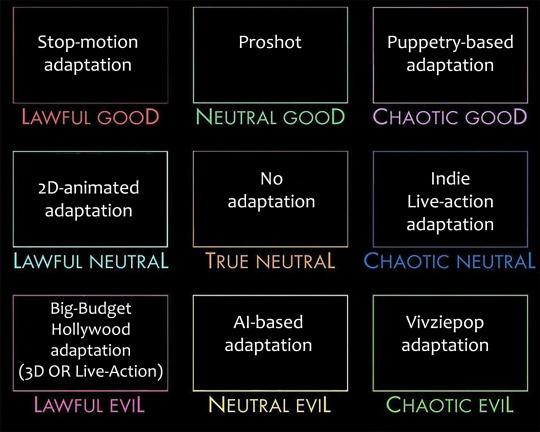
My objectively correct opinions on a hadestown adaptation
(Explanation under the cut)
For the purposes of this chart, the hypothetical Hadestown adaptation would follow the original Broadway production (2019).
Lawful Good: Out of all animated possibilites, this would be the medium I'd want to see a HT adaptation in purely for its tangibility and underground atmosphere. Stopmo is considered inherently kitsch and a less 'pretty' animation medium in the eyes of the public. Critics only recognize it if a big name is attached (see Guillermo del Toro's Pinocchio, which won the Golden Globe for its running year). Therefore, there's no real fear of an adaptation like this getting too popular, and a smart director would use this tactile medium to restore the scrappy, raw feel of the Vermont production. Even if the conditions aren't perfect, as long as a studio that isn't Laika or Aardman takes the helm, there's a good chance the average stopmo director can be trusted with the show. Overall, this is my pie-in-the-sky option, though it'll probably never happen.
Neutral Good: The next best thing, and hopefully what we will get. Personal preference would leave lyrics the way they were in the original Broadway version, but I can't always get what I want.
Chaotic Good: A stage puppet version of Hadestown gets created and posted for free on YouTube and it gets, like, 100,000 views. The puppets are wonderful, the stage is great, and the actors are... good. Lots of exciting staging options to be had here. Gets as creatively interesting as possible without losing anything to the scope of a screen or animated fluff. Not really an official adaptation but still pretty cool, right?
Lawful Neutral: Look, I love 2D as much as the next guy, but anything could happen. 2D is functionally limitless in what you can do with it, which sets it apart from other mediums... for better or worse. I fear a lot of directors would go crazy with the visuals and forget to ground Hadestown in its emotional core. I think Cartoon Saloon would get it, though. While not the most top-tier team of directors, their eye for visual storytelling is unmatched. Just look at Screecher's Reach if you don't believe me. If they can bring the same amount of writing prowess to Hadestown as they did The Breadwinner, it could work. 2D is also in high demand from certain audiences (though not all), so it could run the risk of getting dangerously generic to appeal to everybody. To quote Chris Sanders, who'd just finished up work on The Lion King when he said this: "This is either gonna be huge, or it's not gonna work at all."
True Neutral: Sometimes it's best to let some shows stay as they are. Hadestown is one of those shows.
Chaotic Neutral: "indie" has become a subjective term I think, because "indie" ranges from "two people with a string" to "Amazon Prime/Netflix-funded, B-list actor, industry-standard tech with a slightly smaller fanbase". That was definitely not a slight at anyone in particular. There's already some college theatre-esque medleys on YouTube, but those aren't really full adaptations. While there'd be a lot of heart and passion in this project, the limited budget/opportunities would detract from the show's scale, and be a little embarrassing to watch tbh.
Lawful Evil: The Wicked treatment. Or maybe the Illumination treatment? Oh, no. Ew. Don't wanna think about that. 3D appeals to general audiences and gets used by the big companies more, so by that association it gets lumped in with the rest of Hollywood. Not great, overproduced, weird casting choices (related snide: in a show that's cultivated a diverse range of vocals, why on earth were Betty Who and Jordan Fisher casted on Broadway? Besides stuntcasting, of course...). A dishonest portrayal of an honest show. Could be worse, though. I can only see a 3D animated adaptation working if some smaller, non-US studio goes absolutely batshit during visdev. Other than that, 3D is too polished and techy to fit the needs of the show.
Neutral Evil: The only good thing that comes out of this is that most people see AI as a cheap scammy tool, so whatever HT-ness comes out of it will not tarnish Hadestown's name too much. I doubt it'd be taken seriously at all, if anyone would even care to look at it. I don't even think AI bros would touch the anticapitalist 'woke' themes with a ten-foot pole.
Chaotic Evil: remember what I said during the Chaotic Neutral bloc? That was about Viv. I don't care that she technically falls into Lawful Neutral, this is its own circle of hell. It's worse than AI because unlike AI, which is forgettable, Viv's understandings of mythology, gender, and politics are actively, stupidly shallow. Can you imagine what would happen to Eurydice and Persephone? Or the Fates? Could you imagine the sexism? The stereotyping? The song 'Flowers' might as well not exist. Persephone would be painted as a crazy drunk abuser. The negative cultural impact + Viv's rabid fanbase would ruin me forever. This idea has cursed me the moment it popped into my head and if I have to think about it, you do, too. Let's hope it never happens.
#swinging a chainsaw at a hornet's nest to start the new year right#yes this was just an excuse to complain about my animation pet peeves. i have thoughts!#anyway. fingers crossed the *possible* proshot is good#hadestown#rook roars!
25 notes
·
View notes
Text
Silicon Valley let out a sigh of relief on Wednesday when it learned that President Donald Trump’s tariff bonanza included an exemption for semiconductors, which, at least for now, won’t be subject to higher import duties. But just three days later, some US tech companies may be finding that the loophole actually creates more problems than it solves. After the tariffs were announced, the White House published a list of the products that it says are unaffected, and it doesn’t include many kinds of chip-related goods.
That means only a small number of American manufacturers will be able to continue sourcing chips without needing to factor in higher import costs. The vast majority of semiconductors that come into the US currently are already packaged into products that are not exempt, such as the graphics processing units (GPUs) and servers for training artificial intelligence models. And manufacturing equipment that domestic companies use to produce chips in the US wasn’t spared, either.
“If you are a major chip producer who is making a sizable investment in the US, a hundred billion dollars will buy you a lot less in the next few years than the last few years,” says Martin Chorzempa, a senior fellow at the Peterson Institute for International Economics.
The US Department of Commerce did not respond to a request for comment.
Stacy Rasgon, a senior analyst covering semiconductors at Bernstein Research, says the narrow exception for chips will do little to blunt wider negative impacts on the industry. Given that most semiconductors arrive at US borders packaged into servers, smartphones, and other products, the tariffs amount to “something in the ballpark of a 40 percent blended tariff on that stuff,” Rasgon says, referring to the overall import duty rate applied.
Rasgon notes that the semiconductor industry is deeply dependent on other imports and on the overall health of the US economy, because the components it makes are in so many kinds of consumer products, from cars to refrigerators. “They are macro-exposed,” he says.
To determine what goods the tariffs apply to, the Trump administration relied on a complex existing system called the Harmonized Tariff Schedule (HTS), which organizes millions of different products sold in the US market into numerical categories that correspond to different import duty rates. The White House document lists only a narrow group of HTS codes in the semiconductor field that it says are exempted from the new tariffs.
GPUs, for example, are typically coded as either 8473.30 or 8542.31 in the HTS system, says Nancy Wei, a supply chain analyst at the consulting firm Eurasia Group. But Trump’s waiver only applies to more advanced GPUs in the latter 8542.31 category. It also doesn’t cover other codes for related types of computing hardware. Nvidia’s DGX systems, a pre-configured server with built-in GPUs designed for AI computing tasks, is coded as 8471.50, according to the company’s website, which means it’s likely not exempt from the tariffs.
The line between these distinctions can sometimes be blurry. In 2020, for example, an importer of two Nvidia GPU models asked US authorities to clarify what category it considered them falling under. After looking into the matter, US Customs and Border Protection determined that the two GPUs belong to the 8473.30 category, which also isn’t exempt from the tariffs.
Nvidia’s own disclosures about the customs classifications of its products paint a similar picture. Of the over 1,300 items the company lists on its website, less than one-fifth appear to be exempt from Trump’s new tariffs, according to their correspondent HTS codes. Nvidia declined to comment to WIRED on which of its products it believes the new import duties apply to or not.
Bad News for US AI Firms
If a wide range of GPUs and other electronic components are subject to the highest country-specific tariffs, which are scheduled to kick in next week, US chipmakers and AI firms could be facing a significant increase in costs. That could potentially hamper efforts to build more data centers and train the world’s most cutting-edge artificial intelligence models in the US.
That's why Nvidia’s stock price is currently “getting killed,” Rasgon says, having shed roughly one-third of its value since the start of 2025.
“AI hardware, particularly high-end GPUs from Nvidia, will see rising costs, potentially stalling AI infrastructure development in the US,” says Wei from Eurasia Group. “Cloud computing, quantum computing, and military-grade semiconductor applications could also be impacted due to higher costs and supply uncertainties.”
Mark Wu, a professor at Harvard Law School who specializes in international trade, says the looming possibility that other countries embedded in the semiconductor supply chain could impose retaliatory tariffs on the US is creating a very unpredictable environment for businesses. Trump may also soon announce more tariffs specifically targeting chips, something he alluded to at a press briefing on Thursday. “There's so many different scenarios,” Wu says. “It’s almost futile to sort of speculate without knowing what's under consideration.”
More Challenges to Reshoring
Trump has said that his trade policies are intended to bring more manufacturing to the US, but they threaten to reverse what had been a bumper period for US chipmaking. The Semiconductor Industry Association recently released figures showing that sales grew 48.4 percent in the Americas between February 2023 and 2024, far above rates in China, where sales only increased 5.6 percent, and Europe, which saw sales decrease 8.1 percent.
The US has a relatively small share of the global chipmaking market as a whole, however, due to decades of offshoring. Fabrication plants located in the country account for just 12 percent of worldwide capacity, down from 37 percent in 1990. The CHIPS Act, introduced under the Biden administration, sought to reverse the trend by appropriating $52 billion for investment in chip manufacturing, training, and research. Trump called the law a “horrible thing” and recently set up a new office to manage its investments.
A glaring omission in the list of HTS code exempt from Trump’s tariffs are those that correspond to lithography machines, a highly sophisticated category of equipment central to chipmaking. Most of the world’s advanced lithography machines are made today in countries like the Netherlands (subject to a 20 percent tariff) and Japan (a 24 percent tariff). If these devices become significantly more costly to import, it could get in the way of bringing semiconductor manufacturing back to the US.
Also hit by Trump’s tariffs are a litany of less fancy but still essential ingredients for chipmaking: steel, aluminum, electrical components, lighting, and water treatment technology. All of those goods could become more expensive thanks to tariffs. “This is the classic tariff conundrum: If you put tariffs on something, it protects one kind of business, but everything upstream and downstream can lose out,” says Chorzempa.
US Allies Feel the Heat
While some countries that are already subject to US sanctions, like Russia and North Korea, were not included in the tariffs, many American allies are, like Taiwan, which plays an outsize role in the global semiconductor supply chain today compared to its size, because it’s home to companies like Taiwan Semiconductor Manufacturing Company (TSMC), which produces the lion's share of the world’s most advanced chips.
Taiwan will still feel the impact of the tariffs, despite the semiconductor carve-out, because most of what it actually exports to the US is not exempt, says Jason Hsu, a former Taiwan legislator and senior fellow at the Hudson Institute, a DC-based think tank.
Only about 10 percent of Taiwan’s exports to the US last year were semiconductor products that would be exempt from the new tariffs, according to trade data released by the Department of Commerce. The vast majority of Taiwan’s exports are things like data servers and will be taxed an additional 32 percent.
Unlike TSMC, Taiwanese companies that make servers often operate on thin margins, so they may have no choice but to raise prices for their American clients. “We might be looking at AI server prices going completely out of the roof after that,” Hsu says.
Hsu notes that the new tariffs will particularly hurt Southeast Asian countries, which could undermine a long-standing US strategic objective to decouple from supply chains in China. Countries in the region are being hit with some of the highest tariff rates of all—like Vietnam at 46 percent and Thailand at 36 percent—figures that could deter chipmaking companies like Intel and Micron from moving their factories out of China and into these places.
“I see no soft landing to this,” Hsu says. “I see this as becoming an explosion of global supply chain disorder and chaos. The ramifications are going to be very long and painful.”
9 notes
·
View notes
Text
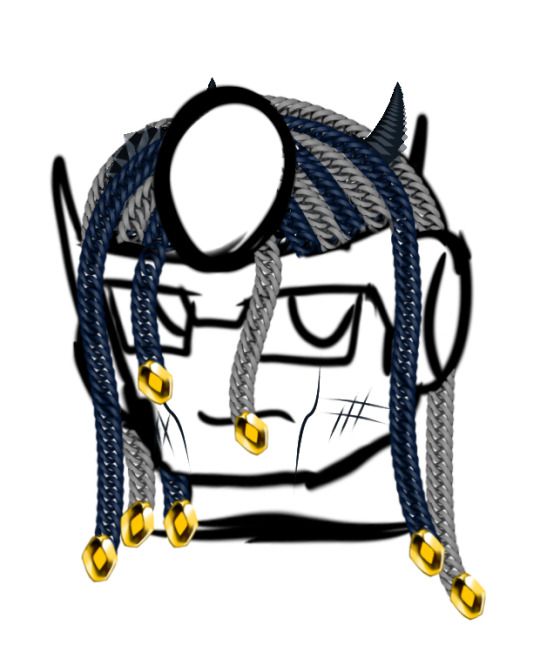
//I. I caved and finally got to indulge myself (and the dash) by doing HT with. With hair. Uh. Y-Yeah HDJFJDKDK I added a bonus little rambling below if you’re interested in what I cooked with this. And yeah, those are lil horns :)
Only mutuals can reblog

— High Tide is half Cybertronian half Predaconian, but he’s actually half Eukarian-Predacon since his mom originated from Eukaris, despite being pure-blood Ancient Predacon.
— Those originated from Eukaris present organic-like features like fur, scales and, sometimes, cable-like hair; reason why High Tide has it since he’s tech-organic.
— He rarely takes his helm piece off (and it’s a requirement to remove his facepipes if he does so) not necessarily because of his hair, but because of the horns presented in his helm and because he’s in constant battle / rescue protocol. And yeah because he’s shy too, of course
— Even during his gladiatorial times, he never took his helm off in front of anyone, meaning that this is a secret well sealed since the horns might be a problem in emphasizing the weird rumors about him being the Unmaker’s child.
— His cheeks are actually quite soft and a bit sensitive, and it’s often with little scratches underneath because of the pressure applied by his facepipes and/or because he hurt himself by forcing his jaw open.
#🌊 | outside the ship / ooc#🌊 | Lapis did a thing / arts & edits#🌊 | from another point of view / headcanons#[ aight chat u can call me cringe now ]
12 notes
·
View notes
Text
Recently was enlightened that MELIC HT is an anagram of LIM TECH
10 notes
·
View notes
Text
I'm just getting interested in Clusterfuck City
Sorry I mean Neom: The Line. Seriously this is brilliant. We all get to live in a world where the disasterous dystopian bullshit you get to experience in games is now a real life place!
The Prince of Saudi who's planning this has more money than briancells and has hired a bunch of yes men at 75,000 a day to tell him whatever he wants to hear...
More analysis here
Summary: Someoen told this pricne that they can have a 200km train that goes end to end in 20 minutes which means that it eitehr won't stop and travels at 500kph, or It stops but hits mach 1.3 between stops.
They also promised animatronic dinosaurs (OK not crazy), an artificial moon to use as a light source and giant, shitty TV (Fucking nuts), Robot maids (OK this one's semi plausible until it does the laundry and folds your clothes while you're wearing them).
Yadda. People have been over this. And all the human rights abuses because I dunno is Nestlé running this project?
The thing I'm fascinated by is the idea of a 200m thick city that's 500m tall and 197m long. Because modern Skyscrapers sway, and they're desgned to. Some of the really tall ones without sufficient width have wind tunnels so they don't just flop over. Now I invite you to think of an entire wall that's 500m high, 200m thick and mostly hollow glass and space frames with excitingly chunky habitat modules bolted on. And what happens when the wind, unencumbered by vegetation or terrain hits this thing and starts pushing on any part of it. In a sensible world, the thing would be sectional, with a flared base ~~so you can pull it back out~~ to resist lateral pressure, and you'd make it in air-gaped sections so they don't grind or twist and crunch into each other.
Which is horrible and I worked in a building where there was a 20cm gap between each halves of the building for this reason. Legend has it, the architect having discovered that the only reason the building didn't fall down was due to the brtalist exterior stairwells being made of iron vs wood, as in the previous building he'd built to the smae plan (Which all collapsed) thought ht ematter over, went up to the roof, picked a direction and started walking until all his troubels were over. This may be apocryphal. That building had panels with warnings on them saying 'If this panel is cracked stop breathing' because they were asbestos. Good times.
Anyway even if they got The Line built (It's been scaled back form 197KM to uhhh, 500m?) it's build on the premise that a whole bunch of tech will get invented and perfected in the next few months, the entire world will be OK witht eh Saudi Forced Labour racket and that 6,000 people per square km won't somehow cause some sort of populations ingularity that will have historians int eh future say "And of course Neom's Line city and Shanghai Walled city ar ehte resons we don't do this"
24 notes
·
View notes
Text
5 things about AI you may have missed today: OpenAI's CLIP is biased, AI reunites family after 25 years, more
Study finds OpenAI’s CLIP is biased in favour of wealth and underrepresents poor nations; Retail giants harness AI to cut online clothing returns and enhance the customer experience; Northwell Health implements AI-driven device for rapid seizure detection; White House concerns grow over UAE’s rising influence in global AI race- this and more in our daily roundup. Let us take a look. 1. Study…

View On WordPress
#ai#AI in healthcare#AI representation accuracy#AI Seizure detection technology#Beijing DeepGlint technology#Ceribell medical device#DALL-E image generator#DeepGlint algorithm#G42 AI company#global AI race#HT tech#MySizeID#online clothing returns#OpenAI#openai CLIP#tech news#UAE AI advancements#University of Michigan AI study#Walmart AI initiatives#White House AI concerns
0 notes
Text

Name: Hyperlaser, Zeno, Callum, Farris, Kendrix, Leander, Tobias, Tristan, Blaise, Ulysses, Gunner, Lance, Brutus, Judah, Abaddon
Age: permaadult, agevague, cismiddleaged
Gender: male, transmasc, bxy, boything, male leaning nonbinary, agenderflux, demiboy, boyflux, agender, ambigender, cassgender, demiflux, fluidflux, gendervoid, libramale
Pronouns: he/him, they/them, unsettle/unsettleself, gun/gunself, laser/laserself, mask/maskself, tech/techself, wire/wireself, empty/emptyself
Orientation: gay, aceflux
Species: inphernal
Source: ph!g///ht!ng (replace ! with i and remove the /)
Roles: Aggressor, Catalyst, Confronter, Enforcer, Gunslinger, Maintainer, Persecutor, Protector
Sign off: 🔫, 🔷, 🖤, 🏴, 🍺, ⛓, 🔗, 🌌, 🌀, ☄, 💫, 🕳
Likes: quiet spaces, coffee, bitter food, bar music, getting work done
Dislikes: disorganized chaos, cleaning up after others
IDs: cisbulky, cisburnedskin, cisscars, sourcemercenary, cisptsd, triscotards, cisbrokenhorns, trissch1zospec, blackbloodic, demontailic, permahelmet, cismilitaryfashion, trisclaws, transbl00dshot, triseyebags, trisblackhair, permatall, gunp0wd3rscentic, permasoldier, permaintimidating, permainjured, trisharmful, cisharmed, tristhreat, transtoxic, transhateful
Paras: any!!
Pos triggers: the smell of gunpowder, calm music, cats, close friends
Neg triggers: the sound of gunshots or fireworks
3 notes
·
View notes
Text
Atlas II AS7-D-HTb 'Aumakua'

(note: the above propaganda piece/dramatization of the Battle of Coromodir, produced in 3035, depicts a standard Atlas in place of the 'Mech's true status as an Atlas II. Broad details such as the original weapons loadout and the Aurigan Royal Guards paintjob are accurate, however.)
Mass: 100 tons Chassis: Foundation Type 10X-C Power Plant: Vlar 300 XL Cruising Speed: 32.4 kph Maximum Speed: 54 kph Jump Jets: Army Comm Class 5 Jump Capacity: 0 meters Armor: StarSlab/2L Ferro-Lamellor with CASE II Armament: 1 LRM 20 (w/ Artemis V FCS) 1 LAC/20 1 Streak SRM 6 2 Medium Pulse Laser 2 ER Large Laser Manufacturer: Defiance Industries,Hegemony Research and Development Department, Weapons Division Primary Factory: Hesperus II,New Earth Communication System: Army Corporation Type 29K Targeting & Tracking System: Unknown Introduction Year: 3153 Tech Rating/Availability: F/X-X-X-X Cost: 32,988,000 C-bills
Deployment Its origins unknown, the only known example of the AS7-D-HT was found inside Castle Nautilus, an SLDF Outpost Fortress found on the world of Artru in the Aurigan Reach (located thanks to coordinates recovered by Fursona's Fusiliers onboard the now-ACS Dobrev), and used by Kamea Arano during her final defeat of the Aurigan Directorate - by the end of the campaign it had come to be referred by the name "Aumakua". This seemingly custom variant retained the bulk of the standard model's weapon loadout save swapping the LB-X-10 for a mammoth Autocannon/20 for enhanced short-range combat.
In the century and a quarter since its initial discovery, the 'Mech has been rebuilt and further modified multiple times, as the Aurigan military strove to keep up with modern technological developments; by 3153, the 'Mech mounts an experimental Light Autocannon/20 firing caseless ammunition (loaned by the Federated Suns, and capable of replicating the enhanced rate of fire of an Ultra Autocannon - while being much lighter and less bulky), along with Clan variants of (or upgrades to) all the original configurations' weaponry - the LRM 20 coupled to an Artemis V fire control system, and the original SRM 6 swapped for a Streak SRM 6.
The redesigned 'mech also mounts Clan double heat sinks - 14 of which provide extensive heat dissipation to the design; these are further backed up by a combat computer for heat management and a RISC Emergency Coolant System (likely obtained through Fusiliers connections with the Republic and indeed RISC itself). Covering the 'mech are 22 tons of Ferro-Lamellor armor - ensuring that the enemy will struggle to deal damage, and if the enemy does breach the outer layers of armor, they will find the Clan-spec XL engine and gyro have both been further armored. Finally, the 'mech has been mounted with CASE II to protect against ammunition explosions, and the head of the 'Mech has been armored extensively - in addition to full Ferro-Lamellor armor coverage, further internal armoring was applied to the entire head assembly - including the sensors and life support, as well as the added cargo space (used to expand the internal amenities available to the High Lord/Lady - leading to the 'Mech's unofficial nickname of "the Royal RV") and the remote drone command console operated by a Royal Guard MechWarrior (who is additionally trained in close protection). Lastly, an extremely (some have gone so far as to say "excessively") armored cowl has been draped over the head, with multiple redundant layers of armor in all directions, but especially heavy in the rear and side directions. This ensures that the leader of the Aurigan Coalition has little to fear from their enemies.
[Detected uploaded file: AS7-D-HTb_Aumakua_TRO.txt]
[Access file?] [Y / N]
Type: Atlas II Technology Base: Mixed (Unofficial) Tonnage: 100 Battle Value: 2,629
Equipment Mass Internal Structure Composite 5 Engine (Armored) 300 XL 9.5 Walking MP: 3 Running MP: 5 Jumping MP: 0 Double Heat Sink 14 [28] 4 Compact Gyro (Armored) 4.5 Small Cockpit (Armored) 2 Armor Factor (Ferro-Lamellor) 307 22 Internal Structure Armor Value Head 3 9 Center Torso 31 47 Center Torso (rear) 15 R/L Torso 21 32 R/L Torso (rear) 10 R/L Arm 17 34 R/L Leg 21 42
Right Arm Actuators: Shoulder, Upper Arm, Lower Arm, Hand Left Arm Actuators: Shoulder, Upper Arm, Lower Arm, Hand
Weapons and Ammo Location Critical Heat Tonnage Cargo (0.5 tons) (Armored) CT 1 - 0.5 RISC Emergency Coolant System CT 1 - 2.0 2 Medium Pulse Laser CT 2 4 4.0 CASE II RT 1 - 0.5 LRM 20 Artemis V-capable Ammo (12) RT 2 - 2.0 2 Double Heat Sink RT 4 - 2.0 Caseless LAC/20 Ammo (30) RT 3 - 3.0 2 ER Large Laser LA 2 12 8.0 Artemis V FCS LT 2 - 1.5 CASE II LT 1 - 0.5 Streak SRM 6 LT 2 4 3.0 Streak SRM 6 Ammo (15) LT 1 - 1.0 LRM 20 LT 4 6 5.0 Armored Cowl (Armored) HD 1 - 1.0 Remote Drone Command Console (Armored) HD 1 - 2.0 LAC/20 RA 6 7 9.0
Features the following design quirks: Accurate Weapon (all), Battle Computer, Battle Fists, Combat Computer, Cowl, Distracting, Easy to Pilot, Extended Torso Twist, Improved Communications, Improved Cooling Jacket (all), Improved Life Support, Improved Sensors, Multi-Trac, Protected Actuators, Rumble Seat, Searchlight, Variable Range Targeting
6 notes
·
View notes
Text
Real innovation vs Silicon Valley nonsense
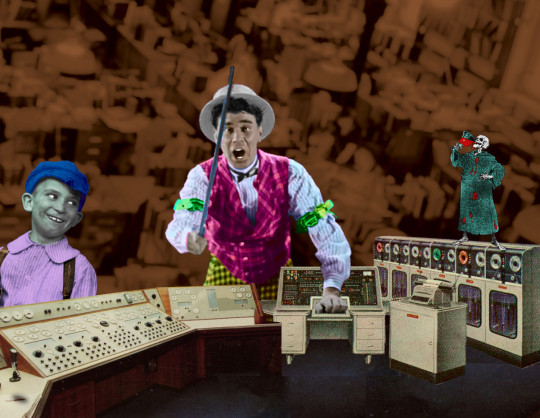
This is the LAST DAY to get my bestselling solarpunk utopian novel THE LOST CAUSE (2023) as a $2.99, DRM-free ebook!

If there was any area where we needed a lot of "innovation," it's in climate tech. We've already blown through numerous points-of-no-return for a habitable Earth, and the pace is accelerating.
Silicon Valley claims to be the epicenter of American innovation, but what passes for innovation in Silicon Valley is some combination of nonsense, climate-wrecking tech, and climate-wrecking nonsense tech. Forget Jeff Hammerbacher's lament about "the best minds of my generation thinking about how to make people click ads." Today's best-paid, best-trained technologists are enlisted to making boobytrapped IoT gadgets:
https://pluralistic.net/2024/05/24/record-scratch/#autoenshittification
Planet-destroying cryptocurrency scams:
https://pluralistic.net/2024/02/15/your-new-first-name/#that-dagger-tho
NFT frauds:
https://pluralistic.net/2022/02/06/crypto-copyright-%f0%9f%a4%a1%f0%9f%92%a9/
Or planet-destroying AI frauds:
https://pluralistic.net/2024/01/29/pay-no-attention/#to-the-little-man-behind-the-curtain
If that was the best "innovation" the human race had to offer, we'd be fucking doomed.
But – as Ryan Cooper writes for The American Prospect – there's a far more dynamic, consequential, useful and exciting innovation revolution underway, thanks to muscular public spending on climate tech:
https://prospect.org/environment/2024-05-30-green-energy-revolution-real-innovation/
The green energy revolution – funded by the Bipartisan Infrastructure Act, the Inflation Reduction Act, the CHIPS Act and the Science Act – is accomplishing amazing feats, which are barely registering amid the clamor of AI nonsense and other hype. I did an interview a while ago about my climate novel The Lost Cause and the interviewer wanted to know what role AI would play in resolving the climate emergency. I was momentarily speechless, then I said, "Well, I guess maybe all the energy used to train and operate models could make it much worse? What role do you think it could play?" The interviewer had no answer.
Here's brief tour of the revolution:
2023 saw 32GW of new solar energy come online in the USA (up 50% from 2022);
Wind increased from 118GW to 141GW;
Grid-scale batteries doubled in 2023 and will double again in 2024;
EV sales increased from 20,000 to 90,000/month.
https://www.whitehouse.gov/briefing-room/blog/2023/12/19/building-a-thriving-clean-energy-economy-in-2023-and-beyond/
The cost of clean energy is plummeting, and that's triggering other areas of innovation, like using "hot rocks" to replace fossil fuel heat (25% of overall US energy consumption):
https://rondo.com/products
Increasing our access to cheap, clean energy will require a lot of materials, and material production is very carbon intensive. Luckily, the existing supply of cheap, clean energy is fueling "green steel" production experiments:
https://www.wdam.com/2024/03/25/americas-1st-green-steel-plant-coming-perry-county-1b-federal-investment/
Cheap, clean energy also makes it possible to recover valuable minerals from aluminum production tailings, a process that doubles as site-remediation:
https://interestingengineering.com/innovation/toxic-red-mud-co2-free-iron
And while all this electrification is going to require grid upgrades, there's lots we can do with our existing grid, like power-line automation that increases capacity by 40%:
https://www.npr.org/2023/08/13/1187620367/power-grid-enhancing-technologies-climate-change
It's also going to require a lot of storage, which is why it's so exciting that we're figuring out how to turn decommissioned mines into giant batteries. During the day, excess renewable energy is channeled into raising rock-laden platforms to the top of the mine-shafts, and at night, these unspool, releasing energy that's fed into the high-availability power-lines that are already present at every mine-site:
https://www.euronews.com/green/2024/02/06/this-disused-mine-in-finland-is-being-turned-into-a-gravity-battery-to-store-renewable-ene
Why are we paying so much attention to Silicon Valley pump-and-dumps and ignoring all this incredible, potentially planet-saving, real innovation? Cooper cites a plausible explanation from the Apperceptive newsletter:
https://buttondown.email/apperceptive/archive/destructive-investing-and-the-siren-song-of/
Silicon Valley is the land of low-capital, low-labor growth. Software development requires fewer people than infrastructure and hard goods manufacturing, both to get started and to run as an ongoing operation. Silicon Valley is the place where you get rich without creating jobs. It's run by investors who hate the idea of paying people. That's why AI is so exciting for Silicon Valley types: it lets them fantasize about making humans obsolete. A company without employees is a company without labor issues, without messy co-determination fights, without any moral consideration for others. It's the natural progression for an industry that started by misclassifying the workers in its buildings as "contractors," and then graduated to pretending that millions of workers were actually "independent small businesses."
It's also the natural next step for an industry that hates workers so much that it will pretend that their work is being done by robots, and then outsource the labor itself to distant Indian call-centers (no wonder Indian techies joke that "AI" stands for "absent Indians"):
https://pluralistic.net/2024/05/17/fake-it-until-you-dont-make-it/#twenty-one-seconds
Contrast this with climate tech: this is a profoundly physical kind of technology. It is labor intensive. It is skilled. The workers who perform it have power, both because they are so far from their employers' direct oversight and because these fed-funded sectors are more likely to be unionized than Silicon Valley shops. Moreover, climate tech is capital intensive. All of those workers are out there moving stuff around: solar panels, wires, batteries.
Climate tech is infrastructural. As Deb Chachra writes in her must-read 2023 book How Infrastructure Works, infrastructure is a gift we give to our descendants. Infrastructure projects rarely pay for themselves during the lives of the people who decide to build them:
https://pluralistic.net/2023/10/17/care-work/#charismatic-megaprojects
Climate tech also produces gigantic, diffused, uncapturable benefits. The "social cost of carbon" is a measure that seeks to capture how much we all pay as polluters despoil our shared world. It includes the direct health impacts of burning fossil fuels, and the indirect costs of wildfires and extreme weather events. The "social savings" of climate tech are massive:
https://arstechnica.com/science/2024/05/climate-and-health-benefits-of-wind-and-solar-dwarf-all-subsidies/
For every MWh of renewable power produced, we save $100 in social carbon costs. That's $100 worth of people not sickening and dying from pollution, $100 worth of homes and habitats not burning down or disappearing under floodwaters. All told, US renewables have delivered $250,000,000,000 (one quarter of one trillion dollars) in social carbon savings over the past four years:
https://arstechnica.com/science/2024/05/climate-and-health-benefits-of-wind-and-solar-dwarf-all-subsidies/
In other words, climate tech is unselfish tech. It's a gift to the future and to the broad public. It shares its spoils with workers. It requires public action. By contrast, Silicon Valley is greedy tech that is relentlessly focused on the shortest-term returns that can be extracted with the least share going to labor. It also requires massive public investment, but it also totally committed to giving as little back to the public as is possible.
No wonder America's richest and most powerful people are lining up to endorse and fund Trump:
https://prospect.org/blogs-and-newsletters/tap/2024-05-30-democracy-deshmocracy-mega-financiers-flocking-to-trump/
Silicon Valley epitomizes Stafford Beer's motto that "the purpose of a system is what it does." If Silicon Valley produces nothing but planet-wrecking nonsense, grifty scams, and planet-wrecking, nonsensical scams, then these are all features of the tech sector, not bugs.
As Anil Dash writes:
Driving change requires us to make the machine want something else. If the purpose of a system is what it does, and we don’t like what it does, then we have to change the system.
https://www.anildash.com/2024/05/29/systems-the-purpose-of-a-system/
To give climate tech the attention, excitement, and political will it deserves, we need to recalibrate our understanding of the world. We need to have object permanence. We need to remember just how few people were actually using cryptocurrency during the bubble and apply that understanding to AI hype. Only 2% of Britons surveyed in a recent study use AI tools:
https://www.bbc.com/news/articles/c511x4g7x7jo
If we want our tech companies to do good, we have to understand that their ground state is to create planet-wrecking nonsense, grifty scams, and planet-wrecking, nonsensical scams. We need to make these companies small enough to fail, small enough to jail, and small enough to care:
https://pluralistic.net/2024/04/04/teach-me-how-to-shruggie/#kagi
We need to hold companies responsible, and we need to change the microeconomics of the board room, to make it easier for tech workers who want to do good to shout down the scammers, nonsense-peddlers and grifters:
https://pluralistic.net/2023/07/28/microincentives-and-enshittification/
Yesterday, a federal judge ruled that the FTC could hold Amazon executives personally liable for the decision to trick people into signing up for Prime, and for making the unsubscribe-from-Prime process into a Kafka-as-a-service nightmare:
https://arstechnica.com/tech-policy/2024/05/amazon-execs-may-be-personally-liable-for-tricking-users-into-prime-sign-ups/
Imagine how powerful a precedent this could set. The Amazon employees who vociferously objected to their bosses' decision to make Prime as confusing as possible could have raised the objection that doing this could end up personally costing those bosses millions of dollars in fines:
https://pluralistic.net/2023/09/03/big-tech-cant-stop-telling-on-itself/
We need to make climate tech, not Big Tech, the center of our scrutiny and will. The climate emergency is so terrifying as to be nearly unponderable. Science fiction writers are increasingly being called upon to try to frame this incomprehensible risk in human terms. SF writer (and biologist) Peter Watts's conversation with evolutionary biologist Dan Brooks is an eye-opener:
https://thereader.mitpress.mit.edu/the-collapse-is-coming-will-humanity-adapt/
They draw a distinction between "sustainability" meaning "what kind of technological fixes can we come up with that will allow us to continue to do business as usual without paying a penalty for it?" and sustainability meaning, "what changes in behavior will allow us to save ourselves with the technology that is possible?"
Writing about the Watts/Brooks dialog for Naked Capitalism, Yves Smith invokes William Gibson's The Peripheral:
With everything stumbling deeper into a ditch of shit, history itself become a slaughterhouse, science had started popping. Not all at once, no one big heroic thing, but there were cleaner, cheaper energy sources, more effective ways to get carbon out of the air, new drugs that did what antibiotics had done before…. Ways to print food that required much less in the way of actual food to begin with. So everything, however deeply fucked in general, was lit increasingly by the new, by things that made people blink and sit up, but then the rest of it would just go on, deeper into the ditch. A progress accompanied by constant violence, he said, by sufferings unimaginable.
https://www.nakedcapitalism.com/2024/05/preparing-for-collapse-why-the-focus-on-climate-energy-sustainability-is-destructive.html
Gibson doesn't think this is likely, mind, and even if it's attainable, it will come amidst "unimaginable suffering."
But the universe of possible technologies is quite large. As Chachra points out in How Infrastructure Works, we could give every person on Earth a Canadian's energy budget (like an American's, but colder), by capturing a mere 0.4% of the solar radiation that reaches the Earth's surface every day. Doing this will require heroic amounts of material and labor, especially if we're going to do it without destroying the planet through material extraction and manufacturing.
These are the questions that we should be concerning ourselves with: what behavioral changes will allow us to realize cheap, abundant, green energy? What "innovations" will our society need to focus on the things we need, rather than the scams and nonsense that creates Silicon Valley fortunes?
How can we use planning, and solidarity, and codetermination to usher in the kind of tech that makes it possible for us to get through the climate bottleneck with as little death and destruction as possible? How can we use enforcement, discernment, and labor rights to thwart the enshittificatory impulses of Silicon Valley's biggest assholes?

If you'd like an essay-formatted version of this post to read or share, here's a link to it on pluralistic.net, my surveillance-free, ad-free, tracker-free blog:
https://pluralistic.net/2024/05/30/posiwid/#social-cost-of-carbon
#pluralistic#ai#hype#anil dash#stafford beer#amazon#prime#scams#dark patterns#POSIWID#the purpose of a system is what it does#climate#economics#innovation#renewables#social cost of carbon#green energy#solar#wind#ryan cooper#peter watts#the jackpot#ai hype#chips act#ira#inflation reduction act#infrastructure#deb chachra
157 notes
·
View notes
Text
So I just finished FINALLY clearing out a pretty flat level of some magical jungle-esque biome in my current modded Minecraft world 'cause I'm planning on building like a cottage/shrine/"sacred garden" there. It's basically just supposed to be my home, but I really like building in ways that work in harmony with the natural environment (at least, mostly) and that flesh out the supposed "history" or "lore" of the world itself, even if/though there really isn't any.
All-in-all, I collected APPROXIMATELY…. 14,274 pieces of bamboo 8,321 mahogany wood logs 2,596 rainbow eucalyptus logs 751 mahogany tree saplings 707 sticks 444 rainbow eucalyptus tree saplings 92 jungle wood logs Maybe 20-30 wheat, red jungle grape, and white jungle grape seeds each And 18 jungle tree saplings (This doesn't include all the bullshit that like fell off the little area I'm working on that I was too lazy to go pick up before it despawned.) I also made a little diagram of the resulting chest monstrosity for my friends since I'm terrible with tech and don't know how to screen record:
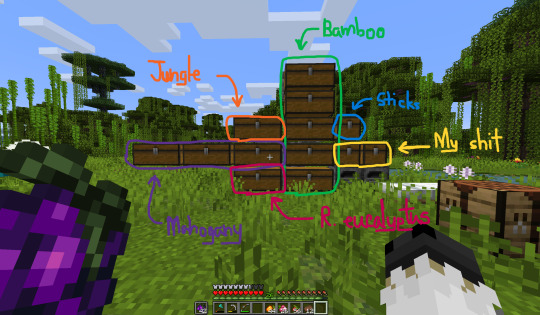
Anyway I just felt really proud of finally finishing this part of my little project. Hopefully I'll start working on the buildings soon, but I think I have to go mining again now that I used up like half of my iron making axes. (Shout-out to HT's TreeChop mod for making this possible. I probably would've just ended it if I had to cut down every single block of wood by hand.)
#burdakk#minecraft#survival minecraft#modded minecraft#PAIN AND SUFFERING#this is what happens when you let me have a vacation
4 notes
·
View notes
Text
Spotlight: Arcee
yeah I'm covering it due to popular demand
anyways
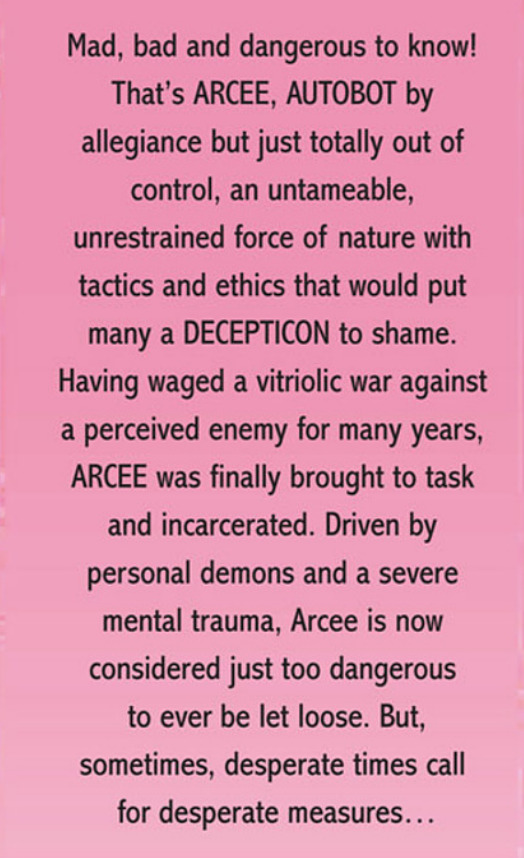
okay so like, she's ostensibly an Autobot but...how how did she become an Autobot why did she become an Autobot WHEN
anyways the first time i read this I thought most of it wasn't that bad but I'm rereading that blurb there and thinking about, you know, most other depictions of Arcee and I'm a bit offended on behalf of fans of her character, you know? like nothing wrong with a little murderblender in fiction, it's call girlpower not girlethics but I can imagine what a slap in the face this was
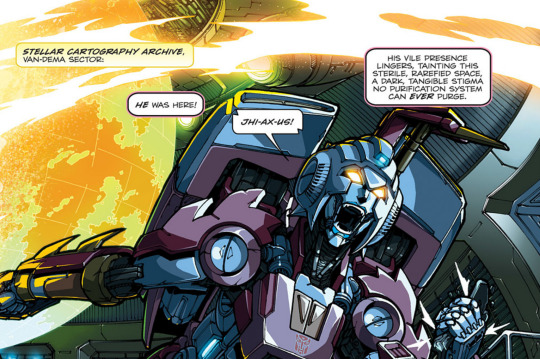
the purple prose continues, tldr she's going to burn it all down
"Arcee..."
Ultra Magnus looms ominous
"This has to stop"
Arcee: Never!
on the topic of Mr. "Gee, Axe Us": my crack theory is that in creating this issue furman was trying to get them to axe the comic
blah blah we can do this the hard way or his way
Arcee: hard
she throws a bunch of grenades at him
one of the grenades explodes. it's a flashbang
UM: HT!
he shields his face with his hands
Ultra Magnus says he's not her enemy but he needs to know why she's left a "trail of carnage" across the galaxy"
to TLDR what Arcee says, Magnus wouldn't get it because he doesn't have "the perception to see his dark designs"
something is coming that will change everything on a fundamental level!
Ultra Magnus stares in dull surprise
Arcee: and I...am the servo-wrench in the works
more like servo-wench? eh? eh?
im sorry that was terrible let's move on
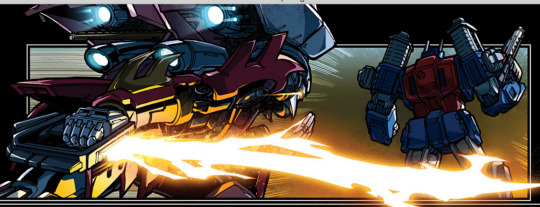
as a sidenote i do really like how her fire sword here really acts like fire and less like a lightsaber you have to admit it is extremely cool
UM says she has left him no choice...

honestly this (her dialogue) is doing more to sell me on her being ancient than anything barber wrote
but also, love the flippy flippy
Arcee says it's nothing personal
Ultra Magnus: so be it!
he throws a grenade
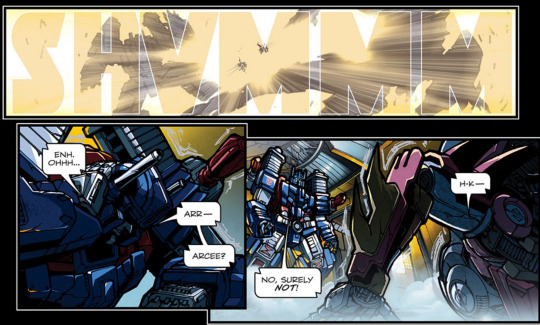
that concussion grenade had enough clout to take down a machadron, whatever that is
he thinks something is very wrong here
Arcee collapses
tww guys who are also there for some reason look at each other
later...
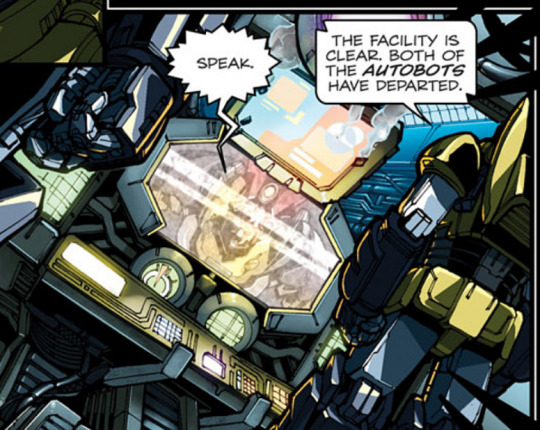
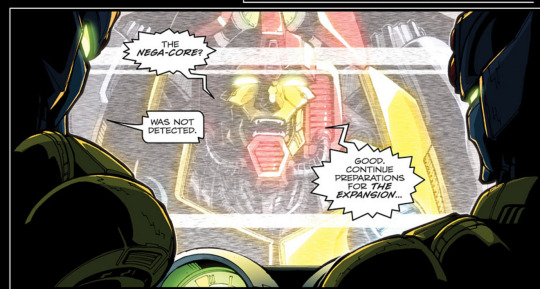
our first look at Jhiaxus' face
and now, over to Garrus-9
there's a shot of Fortress Maximus walking past a bunch of sparks in spark jail or whatever it's called
this is a side note but one of them is "Longtooth" and this won't mean anything to most of you reading this but Longtooth is a minor recurring character in phase 2/3 who is a camera walrus for the main reporter on Cybertron
honestly you know what, good for him that's what i call turning your life around maybe he managed to escape before Overlord trashed the place
Fort Max looks at Arcee's spark for a bit before he gets summoned elsewhere
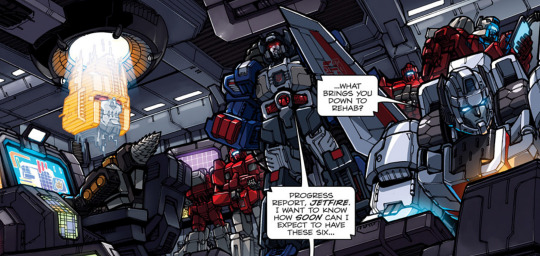
oh hey monstructor!

it's Jetfire talking btw
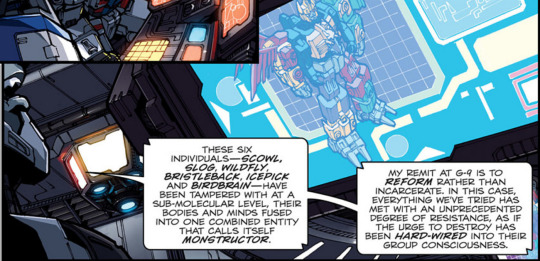
…this actually ties really well into the later added jetfire backstory
Fort Max: which means what, exactly?
Jetfire: that we've got a long ways to go
he tells Max that he gets to lock them up ONLY after they've tried everything they can to help them
Max meanwhile is worried about what happens if the Decepticons find out about this dangerous combiner tech
naturally we then cut over to Banzaitron and his ship which is approaching
Banzaitron wants Monstructor for his secret service
yes. let that one sink in for a bit
monstructor: no one saw monstructor! success doubledealer: THATS BECAUSE YOU KILLED EVERYONE
so there's a big attack on Garrus-9
I'm gonna skip over most of it, lots of stuff exploding guns firing etc etc etc
but we also get these guys' first appearance

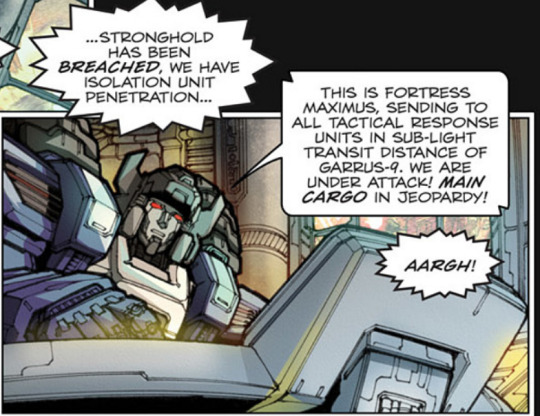
Fort Max asks the computer to give him an Autobot in subcategory 9
the only one that pops out is Arcee and I am ONCE AGAIN WONDERING HOW IS SHE AN AUTOBOT NO SERIOUSLY
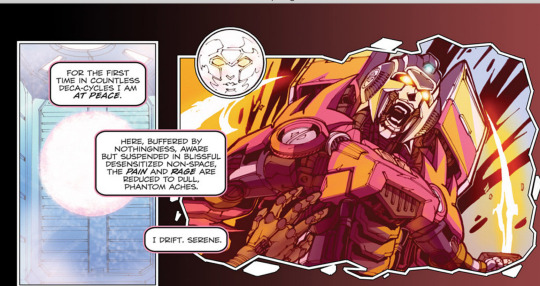
and then unfortunately she gets snapped back to cold reality
"Do you know where you are?"
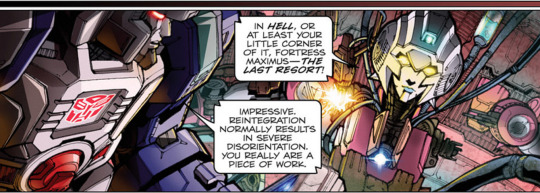
presented without commentary
ok i lied, i'm remembering how this comic made me lose any lingering fondness i had for Fort Max
Fort Max explains that he wants her to help defend the base
Arcee is just like "why should i give a frag about you or this place"
Fort Max: one word. Jhiaxus.
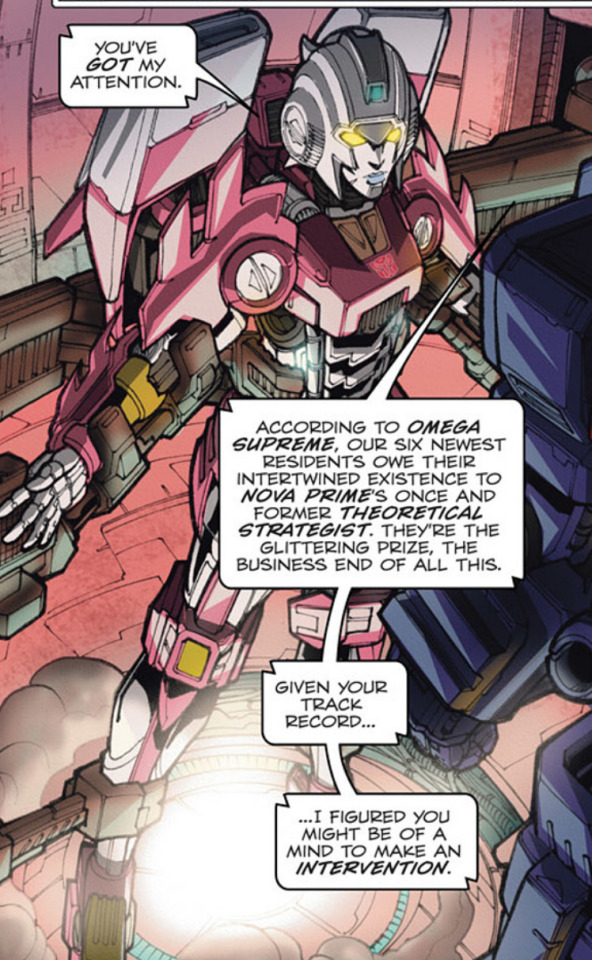
arcee grins evilly
"Yes"
one more thing, if she attacks anyone who isn't wearing a Decepticon badge, or if she tries to run, he'll squash her with some kind of gravity device thing
Arcee: Clear. We're not so different, you and I
and now back to the fight, the Autobots are not doing well
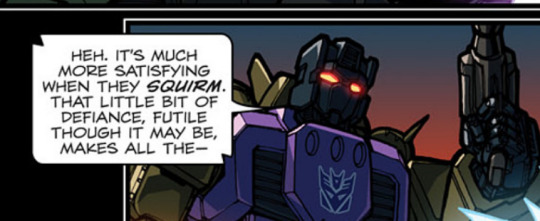
wow this is a wildly divergent characterization for blast off
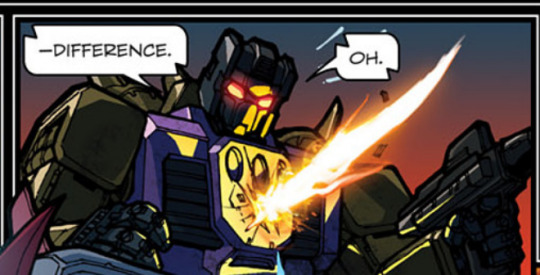
get flame sworded i guess
Whirlwind Arcee is here to kill you
Combaticons: oh no, not her
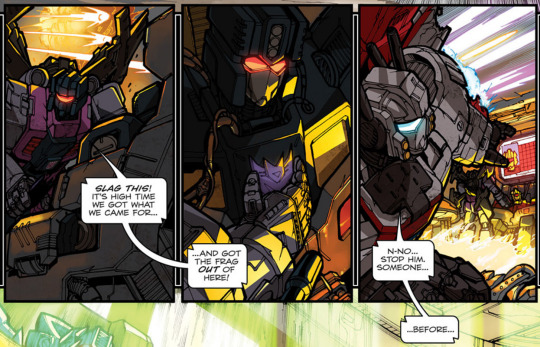
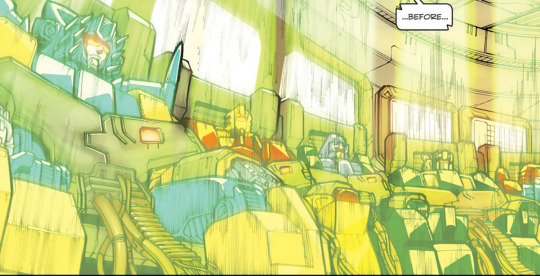
it's Fort Max to the rescue with a very large gun!
but they all get teleported out
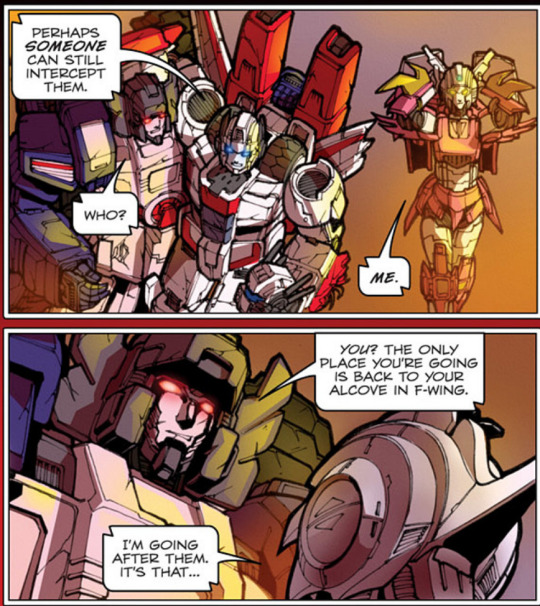
"...or kill me now"
she explains that she's got a link to Jhiaxus so she can find them, since they're also a Jhiaxus experiment
all right so, things have been okay-ish so far right? like, not furman's best writing or anything, but nothing too egregious
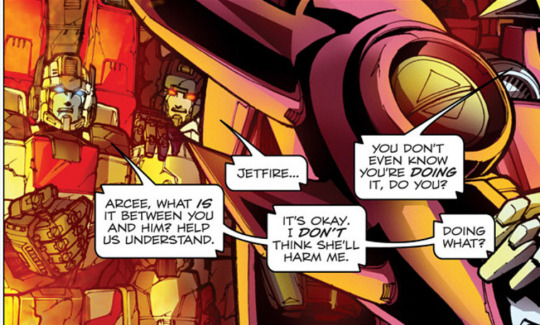
Arcee: "she"
we got SO FAR without being weird about it
we could have just left it here been like 'jhiaxus experimented on me' just have her be murder machine we've got a lot of characters who were turned into living weapons, it could have been good! but no we got arcee…the one robot with Gender
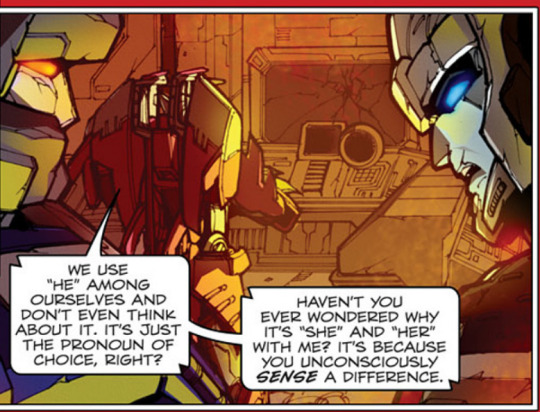
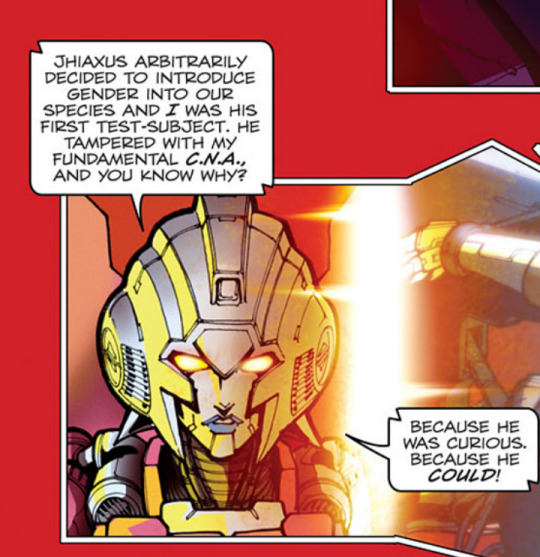
there are many other possibilities we could have gone with for 'why are there female transformers'
created by species with gender
just be like, that's how we figure translates best to English and do a translation convention thing
don't explain it at all, leave it for someone else if they want to also like "introducing gender" so, are there now male transformers? do they unconsciously 'feel' different to genderless transformers the same way arcee does i'd love to be a fly on the wall if someone asked furman that one
furman isn't trying to make a Point ™️ i think he's just very much a man of his time and didn't think things through and doubled down on it (I'm not going to unpack the entire suitcase here. other people besides me have done that. i'll just leave it at this)
but we're not done yet

whoops
Fort Max is about to set off her gravity thing but Jetfire stops him and tells him to let her go
"hmm, you know what, if this Jhiaxus is alive out there somewhere..."
"…I almost feel sorry for him," says Fort Max
Jetfire half-smiles

and that's it for Spotlight Arcee
2 notes
·
View notes
Text
🧐🪐QTNATURäL
®️©️™️ TM

@instagram @greenpartyoftheunitedstates-blog @greenpeaceusa @waynestate @dukeuniv
Interconnected Realities:
A Narrative Exploration
In a world where the echoes of ancient conflicts resonate with modern challenges, the plight of Gaza serves as a stark reminder of humanity's struggles.
- For over 5,000 years, this land has been a stage for wars, rights violations, and humanitarian crises.
- Today, as the world watches, the focus on **disability rights** within conflict zones like Gaza takes center stage.
- The need for inclusive support for those with disabilities becomes even more critical amidst the chaos, highlighting the intersection of war and human rights.
Simultaneously
Simultaneously, the global narrative is enriched by the voices of **Black activists** advocating for **melanin-rich representation** in technology and engineering fields.
- The **BSE in Electric and Computer Engineering** is a beacon of hope for aspiring **techno divas**, paving the way for women and people of color to break barriers in STEM.
- Training programs like these aim to empower the future generation of innovators, fostering a spirit of resilience akin to the **Virtuous Vixen**, a symbol of strength and tenacity.
Finance & Technology
@cashappmehoe @cashappcardhub @cashappshelp
In the realm of finance and technology, platforms like **CashApp** and initiatives surrounding **cryptocurrency** are reshaping how communities interact with money.
- With the rise of **cybersecurity threats**, the role of leaders such as **Tesla's CEO**, the **CFO**, and the **CTO** becomes crucial in safeguarding data and privacy.
- The emergence of **Cyber Homicide** as a criminal phenomenon speaks to the darker side of our digital advancements.
- Individuals like **Kania Helena Kennedy** embody the fight against these threats, leveraging technology to protect vulnerable communities.
Political
In the political arena, figures such as **Kamala Harris**, the Vice President, and **Christopher Wray**, the Director of the FBI, symbolize the intersection of leadership and security in a time of unrest.
- Their roles are pivotal in addressing the challenges posed by both domestic and international crises, including those stemming from conflicts like that in Gaza.
As we navigate these interconnected realities, themes of survival, innovation, and activism emerge, illustrating the resilience of the human spirit. Whether through the lens of ancient wars or modern technological advancements, the call for justice, representation, and security resonates across the globe.
---

kaniakerma
♻️🪐🦄 Green Party: Caucus Neuro-Diversity -
Planet Neurodivergent is a community for people with neuro-divergence to share their stories, resources, and pictures with each other.
♻️🪐🦄 Green Party: Caucus- Kania Kennedy / Kania Kennedy -
The Smart Sista TM : Political Campaign 🌟 Mayor Detroit MI
- Green Party of Michigan US -
- GreenStream TV - Green Party US -#VeteranStgKennedyJr#Moorish #Indigenous #Native #Black
🌺♿📿🎖️⛑️🪶✊🏿♻️🗽🇺🇸Kania H. Kennedy ™️
🌳https://linktr.ee/kaniahkerma
♻️US Green Party
🫱🏽🫲🏾 Telegram Meeting: https://t.me/boost/QuincyTravels ©️ TM
#saturn 🪐#🪐QTN#@🪐QTNATURäL ©️TM#💰paypal @kaniakennedy ®️#💰venmo @kaniakerma ®️#💰Cash $KANIAKENNEDY®️ TM#♻️👀✊🏾🗽🇺🇸🪶👩🏾🏫 jaguarrain ©️#🦹🏾♀️furyblaze🗽✊🏾🧿♻️🔹🇺🇸mi©️#street fighter#🧐🧬🪷faith love peace unity®️#♻️green party 2024 dr. jill stein#writing#Spotify
3 notes
·
View notes